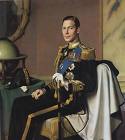George VI 1895 – 1952
January 23, 2009
 George
VI
(Albert Frederick Arthur George) 1895 – 1952 was King of the United
Kingdom and the British Dominions from 11 December 1936 until his death.
He was the last Emperor of India (until 1947) and the last King of
Ireland (until 1949).
George
VI
(Albert Frederick Arthur George) 1895 – 1952 was King of the United
Kingdom and the British Dominions from 11 December 1936 until his death.
He was the last Emperor of India (until 1947) and the last King of
Ireland (until 1949).
George VI was a very firm convert to homeopathy, he even called one of his horses Hypericum which won the 1000 Guineas race in 1946, and he was a patient of Thomas Jeeves Horder (an allopath) and John Weir and William Wilson Rorke (homeopaths).
In 1948, the rebuilt and extensively expanded London Homeopathic Hospital became the Royal London Homeopathic Hospital, when George VI conferred it with title.
As the second son of King George V, he was not expected to inherit the throne and spent his early life in the shadow of his elder brother, Edward VIII. He served in the Royal Navy during World War I, and after the war took on the usual round of public engagements. He married Lady Elizabeth Bowes Lyon in 1923, and they had two daughters, Elizabeth (who succeeded him as Queen Elizabeth II) and Margaret.
At the death of his father in 1936, the future George VI’s brother ascended the throne as Edward VIII. However, less than a year later Edward expressed his desire to marry the twice divorced American socialite Wallis Simpson. For political and religious reasons, the British Prime Minister, Stanley Baldwin, advised Edward that he could not marry Wallis Simpson and remain king. So, Edward VIII abdicated in order to marry.
By reason of this abdication, unique in the history of the British Isles (previous abdications were forced by military or political pressures), George VI ascended the throne as the third monarch of the House of Windsor.
Within twenty four hours of his accession the Irish parliament, the Oireachtas, passed the External Relations Act, which essentially removed the power of the monarch in Ireland.
Further events greatly altered the position of the monarchy during his reign: three years after his accession, his realms, except Ireland, were at war with Nazi Germany.
In the next two years, war with Italy and the Empire of Japan followed.
A major consequence of World War II was the decline of the British Empire, with the United States and the Soviet Union rising as pre eminent world powers.
With the independence of India and Pakistan in 1947, and the foundation of the Republic of Ireland in 1949, King George’s reign saw the acceleration of the break up of the British Empire and its transition into the Commonwealth of Nations.